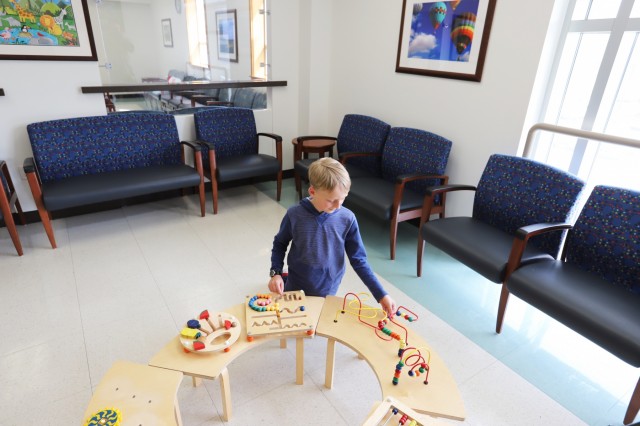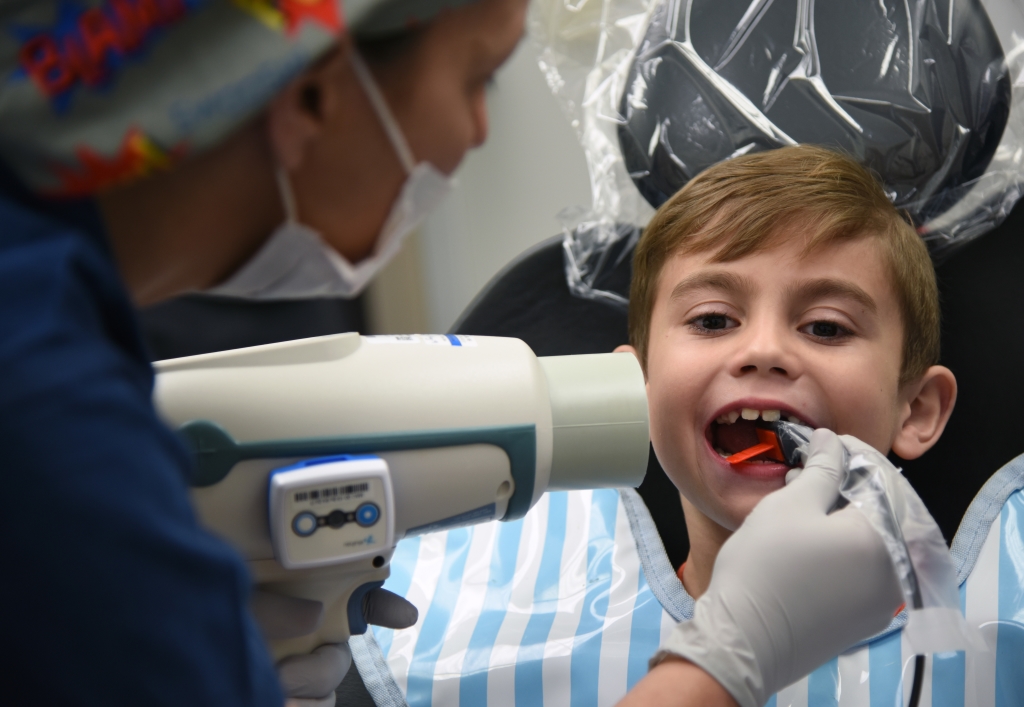Do you dread taking your child to a dental appointment? Going to the dentist is a common childhood fear. You know that dental care is a very important part of a child’s overall health and that you shouldn’t skip it, but when yours is afraid, it can be a miserable experience for everyone. Parents need to strike a balance between “this is important” and “it’s nothing to worry about.”
There are things parents can do to make children at the dentist more comfortable and reduce their anxiety. With some preparation and practice, parents can help their kids have a positive experience at the dentist.
Preparing Your Child

Preparing your child for the dentist can begin long before you’re ready to make the appointment. Teaching healthy oral hygiene habits at home will be a child’s first exposure to dental health. Children model parents’ behavior, so if you brush, floss, and have routine checkups, the concept will be familiar to them when it’s their turn.
Make dental health a habit. It is recommended that you start brushing your baby’s teeth as soon as they erupt. So by the time they are ready for their first dentist appointment (within six months of their first tooth or their first birthday, whichever comes first), having someone look in their mouth and touch their teeth will be part of their daily life.
Check your own anxiety level. It is estimated by the Journal of Dental Anesthesia and Pain Medicine that 80% of the population fears dental treatment and 20% of them avoid the dentist because of it. If so many adults are afraid of the dentist, it’s no surprise that their kids are too. It’s sometimes hard not to let our own fears influence our children. Setting an example by conquering your own anxiety surrounding going to the dentist can go a long way to calming your children.
Find the right dentist. Some dentists are better than others at dealing with children who are scared or uncooperative. Pediatric dentists specialize in treating kids from babyhood throughout adolescence. Not only do they have kid-friendly offices with kid-sized equipment, but they also pay special attention to children’s emotions. Pediatric practices offer a welcoming environment for children at the dentist.
Family dentists might be a good choice too, as they are used to treating everyone from the very young to the very old.
You can use our online tool to find a dentist who can work with your kids. The type of dental practice you choose is less important than how they treat your child. You will want to find someone who acts patient, calm, and friendly toward your child and communicates directly with him or her in easy to understand language. It is important that they see the dentist as a trusted adult who puts them at ease. If your current dentist doesn’t fit the bill, it might be best to look for someone else.
Leading Up to the Big Day
Once the dental appointment is on the calendar, it’s time to prepare the child for what is to come. All kids are different, but it’s usually best not to keep it a secret. Yes, you may have to deal with some nervousness as the date approaches, but simply driving them to the appointment without advance notice could be much more shocking and traumatic.
Explain what will happen and answer questions. Letting children know what to expect will give them a chance to get used to the idea. Answer their questions with straightforward, simple answers that they will understand. Let them know that you will be there with them in the exam room—something that is normal and expected in most dental practices.
Your attitude about the appointment will be important to how they perceive it. If you treat it as an adventure where they will get to sit in a big chair and see all the cool, shiny tools the dentist uses, they might actually look forward to it. There are also toys that mimic dental tools so a child can “play dentist” so they will see it as fun.
Avoid the scary stuff. Your child might hear things about dentists that sound frightening or painful. Don’t mention things like shots, drills, or having teeth pulled unless they bring it up. And if they do want to talk about it, explain that these things don’t happen at a checkup. Some parents calm kids about seeing the dentist by telling them that the dentist just wants to count their teeth and check out the color of their tongue. In the case of a routine checkup, especially for a very young child, it’s true!
Discuss your concerns with the dentist. Make sure the dentist and staff know about your child’s fears. They are used to putting children at the dentist at ease, but it will be helpful to know your child’s level of anxiety ahead of time. They may have different approaches for extreme shyness as opposed to a total meltdown.
For children with special needs or who are on the autism spectrum, a prior conversation with the dentist is crucial. Many dentists are happy to make special accommodations such as dimming the lights or using a quiet exam room to ensure a positive outcome.
At the Dentist’s Office

Go into the dental appointment with a positive attitude, expecting the best.
Bring some comfort from home. If the child has a favorite small toy or blanket, bring it along. As long as it is small, they can hang onto it during the exam. It might also help to schedule sibling’s appointments back-to-back. Kids often want to do what their older brothers and sisters do, so having them get checkups together might make them more comfortable. (Not to mention easier on your schedule!)
Praise and compliment. We don’t suggest that you bribe your children into behaving at the dentist, but it is a good idea to praise their bravery and compliment them on their cooperation. A dentist who is good with kids will do this too, telling them things like what a good brusher they are. Take cues from the dentist and let them know how proud you are of them.
Stay calm and don’t be embarrassed. Children get upset. It comes with the territory. Dentists and their staff know that an appointment can be scary and traumatic for kids. Try not to feel bad if your child acts out. By no means does it mean you are a bad parent.
And don’t be surprised if your child acts differently than you anticipated. For example, some kids who have been nervous might act like it’s “no big deal” when they finally get to the waiting room. Others might throw a last-minute tantrum even though they’ve been putting on a brave face.
Whatever happens, go with the flow. If absolutely necessary, you can always reschedule and try again another time. And if your child’s anxiety is truly unmanageable, talk to your dentist about other options. Dental sedation such as nitrous oxide, commonly known as laughing gas, is safe and effective. It’s a popular solution for children—and adults—who are uncomfortable during dental treatment.
Building Relationships for Future Dental Health
With some preparation and a good attitude, you can help your child have a positive view of their oral health and a trusting relationship with their dental team. They will see going to the dentist as a normal part of their routine rather than something to fear. Laying that foundation when they are young will set them up for a lifetime of good dental health.


